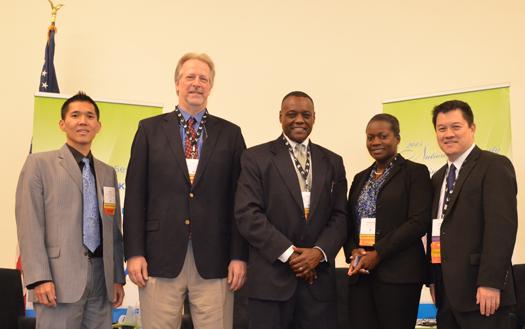|
Created on October 30, 2015 |
The 2015 Minority Enterprise Development Week celebration was held in conjunction with the National Minority Supplier Diversity Council (NMSDC) Conference and Business Opportunity Exchange in San Diego, CA. In this new and innovative collaboration, the Minority Business Development Agency (MBDA) offered several Powered by MBDA sessions that provided the latest information and trends on technology innovation, federal procurement, and international trade. As part of the Powered by MBDA sessions, day four of the NMSDC Conference featured a robust lab-to-market panel discussion moderated by Tyrone C. Taylor from Capitol Advisors on Technology, LLC. The panel included:
- Gary Jones - Federal Lab Consortium (FLC), DC Representative,
- Marlene M. Owens - Deputy (Acting) for Research and Development Partnerships, Science and Technology Directorate for the Department of Homeland Security (DHS), and
- Brian Suh - Director of Technology Transfer at Space and Naval Warfare Systems Command (SPAWAR) and Regional Director of the Federal Laboratory Consortium
Gary Jones gave an overview of the FLC, which represents 18 federal agencies and 300 laboratories and centers. The goal of the FLC is to make technologies created within federal labs available to outside parties. They do this via license agreements, cooperative research and development agreements (CRADA), and facility use agreements. If your business is interested in learning more about federal technology transfer resources, please visit: Federal Laboratory Consortium Business Website or consider attending the FLC National Meeting April 26 — 28, 2016 in Chicago, IL.
Brian Suh shared the perspective of a technology transfer office at one of the 300 laboratories in the country, SPAWAR. SPAWAR, a lab of the Department of the Navy, primarily supports the warfighter. They transfer technology to academia and the private sector via patent licensing agreements and CRADAs. Some technologies are transferred out for development and then retooled for transition to the warfighter. SPAWAR works in partnership with TechLink (www.techlinkcenter.org) to facilitate commercialization. They deal with technologies such as semiconductor development and luminescent algae for checking pollution levels. SPAWAR has an upcoming Small Business Innovation Research (SBIR) funding opportunity that will be released in December of 2015. For more information, visit www.navysbir.com.
Marlene Owens discussed the emphasis that DHS places on interagency coordination and its work with other countries. DHS has Centers of Excellence at 13 universities and cooperative agreements with 13 countries to support security goals. The agency has the ability to build consortia around a technology and make it available to companies in 60 to 90 days. They also have a vehicle for getting fast access to technology innovations from external environments via the Long Range Broad Agency Announcements. Companies and individuals can submit white papers for review without solicitation. DHS also has an SBIR scheduled for release in December of 2015. More information can be found on their website, www.dhs.gov/science-and-technology/sbir .
The panel discussion was a great overview of ways to approach working with federal labs. A big takeaway was that federal labs have several avenues for transferring technologies and resources in and out of the federal government sphere. Labs have ways to license technology created in the labs to external parties; and they also have ways to support technology created externally via SBIR programs and facility use agreements. Both SBIR and FLC are structured as a tax on federal spending by legislation so they will be available for the foreseeable future, but Brian Suh cautioned that “tech transfer is a contact sport and minority businesses must be engaged.” Federal labs and SBIR programs are looking to do business with the minority community and MBDA is proud to support both on the path to commercialization.
Posted at 7:32 AM
Technology and Business
Minority Enterprise Development Week
MBDA Agency



